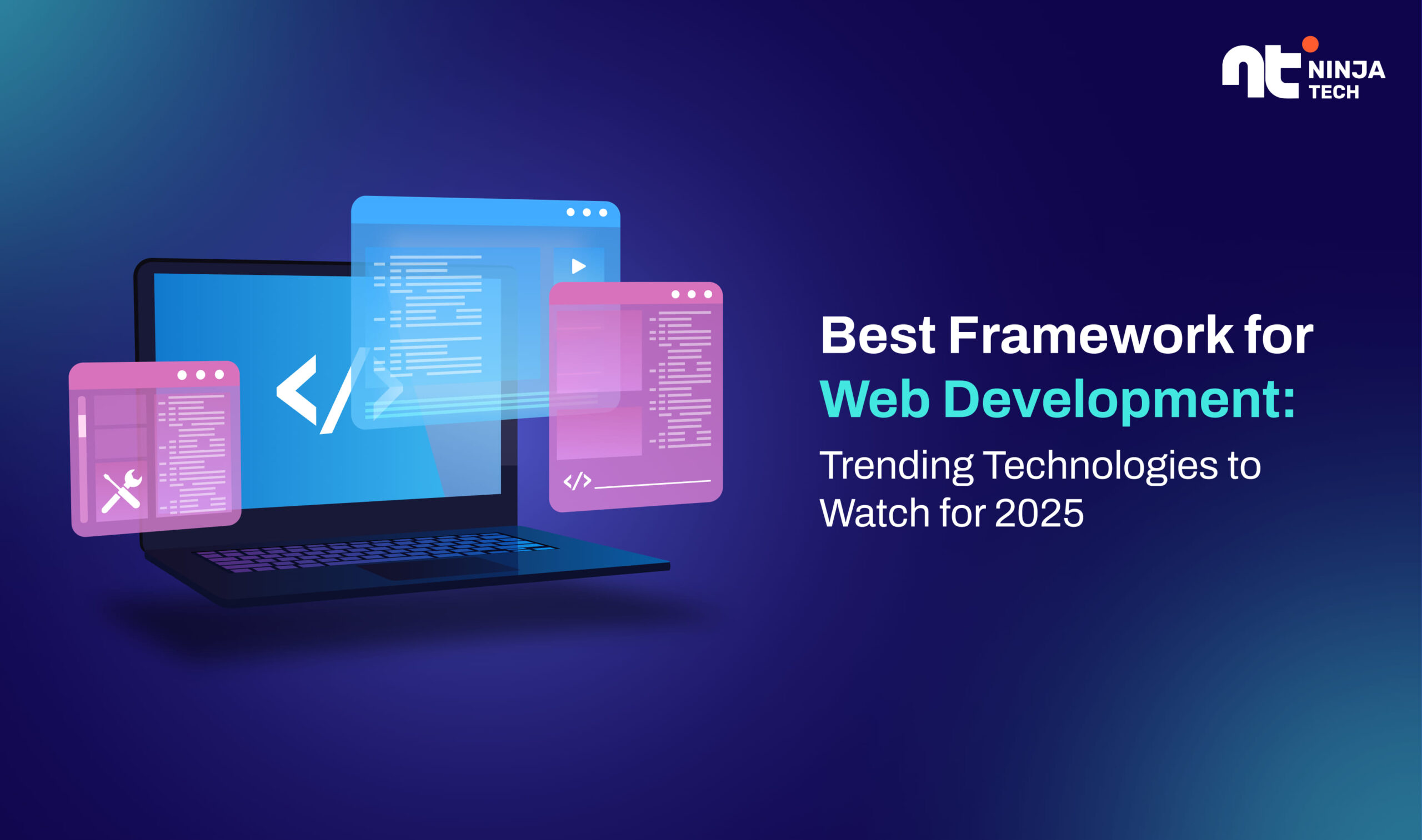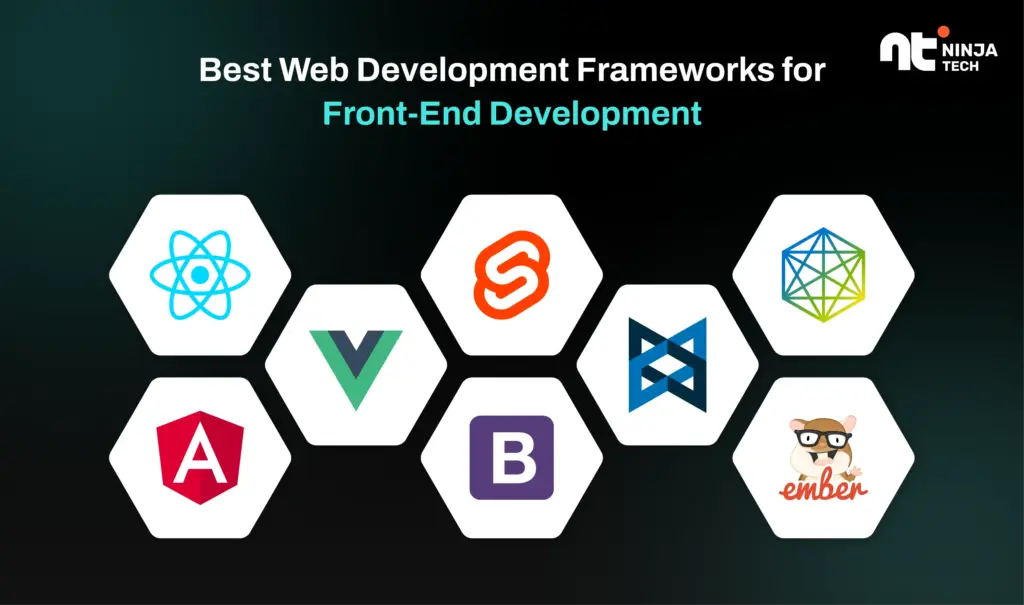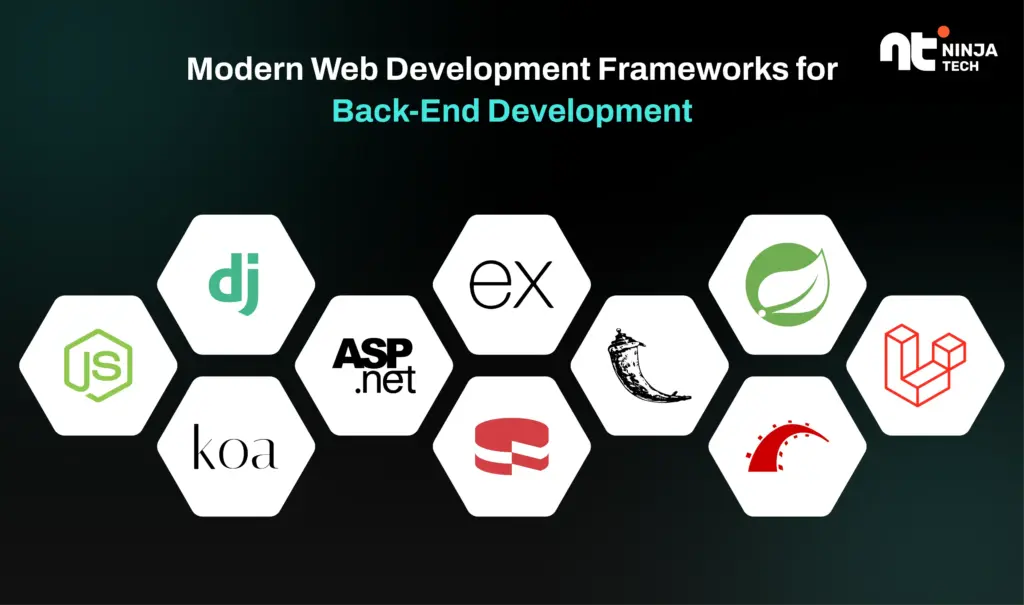Best Framework for Web Development: Trending Technologies to Watch for 2025

What is the best web development framework in 2025? If you are also one of those people, who are looking for the answer to this question, then my friend, you are at the right place.
I totally understand that when it comes to choosing the best framework to build a website, there are a plethora of options available like React, Node, Angular, Golang, PHP, Python, Ruby, and many more. And deciding to go with any of these frameworks without understating the ins and outs of these techs can be a make-or-break decision for you.
No worries! Let’s start with the basics, here’s the basic understanding of what a web development framework is and how to choose the best framework for web development for your project.
Web frameworks come with pre-written code, libraries, and tools that significantly reduce development time. This allows developers to focus on the unique features of a project rather than reinventing the wheel. Whether you’re working with the best framework for web development or one of the most popular web application development frameworks, the efficiency they offer is unmatched.
It’s important to pick the correct framework for your web development project, but with so many alternatives, it can be difficult to figure out which one best suits your needs.
This blog explores the best frameworks for web development, the most popular web frameworks in 2025, and the top web development frameworks that are shaping the future of the industry.
What Is a Web Development Framework?
A web development framework is a pre-built structure designed to simplify and streamline the development process. These frameworks provide developers with tools, libraries, and guidelines to create robust and scalable applications.
Whether you’re building an eCommerce site or a social media platform, the right framework ensures efficiency and functionality.
Benefits Of Using Web Development Frameworks
Web development frameworks have become essential tools for developers looking to create robust, scalable, and efficient websites and applications. These frameworks provide a structured approach, saving time and effort while ensuring high-quality results.
In this article, we’ll explore the key benefits of using web development frameworks and highlight why they are crucial for modern development projects.
1. Faster Development Process
Web frameworks come with pre-written code, libraries, and tools that significantly reduce development time. This allows developers to focus on the unique features of a project rather than reinventing the wheel. Whether you’re working with the best framework for web development or one of the most popular web frameworks, the efficiency they offer is unmatched.
2. Enhanced Security
Most web development frameworks come equipped with built-in security features, helping developers protect their applications from common vulnerabilities such as SQL injection, cross-site scripting (XSS), and data breaches. Frameworks like Laravel, Django, and Ruby on Rails are particularly known for their robust security features, making them some of the most popular web frameworks today.
3. Scalability and Maintenance
Using a web development framework ensures your application is easy to scale and maintain. Frameworks encourage modular coding practices, allowing for smooth updates and scalability as the application grows. This is especially important when choosing the best framework for web development for a long-term project.
4. Community Support
Most web frameworks have extensive communities that provide documentation, tutorials, and support. This makes it easier for developers to troubleshoot issues and implement best practices. Frameworks like React, Angular, and Vue.js owe their popularity to their active and resourceful communities, cementing their place among the most popular web frameworks.
5. Cross-Browser Compatibility
Frameworks ensure that applications work seamlessly across different browsers. They handle compatibility issues, making it easier for developers to focus on functionality rather than debugging cross-browser inconsistencies.
6. Improved Code Quality
Frameworks encourage clean, reusable, and well-documented code. This reduces bugs and ensures that future developers can easily understand and modify the project if needed.
7. Cost-Effectiveness
Web frameworks contribute to lower development costs. Their pre-built components and tools eliminate the need for extensive coding, ensuring budget-friendly development without compromising quality.
Difference Between Front-End Frameworks and Back-End Frameworks
When building modern web applications, the decision to choose any one of the most popular web development frameworks for front-end & back-end development plays a crucial role in ensuring functionality, scalability, and a seamless user experience.
Front-end frameworks like React, Angular, and Vue.js help developers craft visually appealing and interactive interfaces, enabling dynamic content rendering and responsive designs.
On the backend, frameworks such as Node.js, Django, Laravel, and Ruby on Rails streamline server-side processes, database management, and API integrations.
Combining the right frameworks can significantly reduce development time, improve performance, and enhance security, making them indispensable for businesses aiming to deliver cutting-edge digital solutions.
Selecting the ideal framework depends on project requirements, team expertise, and future scalability needs. Let’s take a look at the best frontend frameworks for web development.
Best web development frameworks for Front-end development

Frontend frameworks are pivotal for creating dynamic and responsive user interfaces. These tools streamline the development process and ensure scalability and performance, making them indispensable for developers and businesses alike. Let’s explore some of the most popular front-end frameworks while delving into their unique features.
1. React
Developed by Facebook, React is one of the modern web development frameworks that has gained immense popularity. It uses a component-based architecture, enabling developers to build reusable UI components. React’s virtual DOM ensures high performance, making it a favorite for creating dynamic applications.
2. Angular
Angular, maintained by Google, is a powerful framework for building rich single-page applications (SPAs). As one of the top web development frameworks, Angular offers two-way data binding, dependency injection, and extensive documentation, making it ideal for enterprise-level applications.
3. Vue.js
Vue.js is a lightweight yet versatile framework that combines the best features of React and Angular. Its progressive nature allows developers to adopt it incrementally. For those seeking simplicity without compromising functionality, Vue.js stands out as a leading choice among web development languages and frameworks.
4. Svelte
Unlike traditional frameworks, Svelte shifts much of the work to the build step, resulting in faster and smaller applications. It’s one of the newest entrants in the list of modern web development frameworks and is quickly gaining traction for its unique approach.
5. Bootstrap
While primarily a CSS framework, Bootstrap also includes JavaScript components to create responsive and mobile-first designs. Its pre-designed templates and UI elements make it one of the top web development frameworks for quickly developing professional websites.
6. Foundation
Foundation by Zurb is another responsive framework designed for creating sleek and modern interfaces. It provides advanced tools for animations, grid layouts, and UI components, earning its place in the realm of web development languages and frameworks.
7. Ember.js
Ember.js is a comprehensive framework for building ambitious web applications. Its convention-over-configuration philosophy and robust templating engine make it a reliable choice for creating scalable applications.
8. Backbone.js
Backbone.js offers a minimalistic approach, focusing on providing the core structure for applications using models, views, and routers. Its simplicity and flexibility have secured its spot in the top web development frameworks list.
When we talk about web development, there are multiple aspects like frontend, backend, server etc. As we’ve discussed popular front-end frameworks, it’s the time to discuss the best backend framework for web development.
Modern web development frameworks for Back-end development

Backend frameworks form the backbone of web applications, handling server-side logic, database interactions, and API integrations. Choosing the right backend framework is crucial for creating robust and scalable applications. Below is a list of some of the most popular backend frameworks that are widely regarded as the best frameworks for web development.
1. Node.js
Node.js is a runtime environment built on Chrome’s V8 JavaScript engine, but its extensive libraries and modules make it a framework-like choice. Known for its asynchronous event-driven architecture, Node.js is often hailed as the best framework for web development when it comes to building real-time applications like chat apps and online gaming platforms.
2. Django
Django is a high-level Python-based framework that emphasizes rapid development and clean design. Its built-in security features, scalability, and extensive documentation make it the best web app development framework for developers seeking an all-in-one solution.
3. Ruby on Rails
Ruby on Rails, or simply Rails, is a framework written in Ruby. It promotes convention over configuration, offering ready-to-use tools for routing, database migrations, and more. For startups looking for the best framework to build a website, Rails is an excellent choice due to its speed of development.
4. Laravel
Laravel is a PHP framework known for its elegant syntax and developer-friendly tools. Features like Blade templating, Eloquent ORM, and built-in authentication make it a top contender for the best web app development framework in the PHP ecosystem.
5. Spring Boot
Spring Boot, built on the Spring framework, simplifies Java-based web development. It provides preconfigured tools and eliminates much of the boilerplate code, making it the best framework to build a website for enterprise-level applications.
6. Express.js
Express.js is a minimalistic Node.js framework used to build APIs and web applications. Its flexibility and lightweight nature make it one of the best frameworks for web development, particularly for microservices architectures.
7. Flask
Flask is another Python-based framework known for its simplicity and flexibility. It’s a micro-framework that allows developers to build web apps with minimal effort, making it ideal for smaller projects or developers who prefer control over built-in features.
8. ASP.NET Core
ASP.NET Core, developed by Microsoft, is a cross-platform framework ideal for creating high-performance applications. Its robust ecosystem and seamless integration with other Microsoft tools make it the best web app development framework for Windows-based environments.
9. Koa.js
Created by the team behind Express.js, Koa.js is a lightweight and modular framework designed for better performance and cleaner code. It’s gaining traction as a contender for the best framework for web development in the Node.js space.
10. CakePHP
CakePHP offers a powerful yet simple toolkit for PHP developers. Its built-in CRUD functionality and code generation tools make it a strong candidate for the best framework to build a website for developers looking to streamline workflows.
Other Essential Tools for Web Development
Web development is a dynamic field that requires a combination of creativity, technical expertise, and reliable tools. While coding languages like HTML, CSS, and JavaScript form the foundation, various tools and frameworks streamline the development process and elevate the quality of the final product.
Here’s a look at some essential tools that every web developer should consider using.
1. Version Control Systems
Version control systems like Git are essential for tracking changes in your codebase. They enable collaboration and ensure that no progress is lost, even when experimenting with new features. GitHub and GitLab are widely used platforms for managing repositories.
2. Text Editors and IDEs
Integrated Development Environments (IDEs) and text editors are the backbone of any developer’s toolkit. Tools like Visual Studio Code, Sublime Text, and Atom offer features such as syntax highlighting, debugging, and integrations with other tools.
3. Browser Developer Tools
Every major browser, including Chrome, Firefox, and Edge, comes equipped with developer tools. These tools allow developers to inspect and debug their code, analyze website performance, and test responsiveness across different devices.
4. Testing Tools
Web applications must be thoroughly tested to ensure they are free from bugs and function seamlessly across various platforms. Tools like Selenium, Postman, and Jest are invaluable for automated and manual testing.
5. Design Tools
Before diving into coding, web developers often collaborate with designers to create visually appealing layouts. Tools like Adobe XD, Figma, and Sketch enable developers to translate creative ideas into functional designs.
Things to Consider Before Choosing a Web Development Framework
Selecting the right web development framework is a critical step in building a successful web application. With numerous modern web development frameworks available today, it’s essential to evaluate your options carefully to ensure your project meets your needs effectively. Here are five key factors to consider when choosing the best framework to build a website;
1. Project Requirements and Goals
Every project has unique requirements, so understanding them is the first step. For instance, if you’re developing a dynamic single-page application (SPA), frameworks like React or Angular might be ideal. However, if you need server-side rendering or SEO-friendly components, Next.js or Vue.js could be more suitable. Tailor your choice to your project’s goals and scalability needs.
2. Performance and Speed
The performance of your web application greatly depends on the framework you choose. Lightweight frameworks such as Svelte offer fast rendering times and better page load speeds, while robust frameworks like Django or Ruby on Rails excel in handling complex backend tasks. When looking for the best framework for web components, ensure it offers optimized performance for a seamless user experience.
3. Community Support and Documentation
A framework with an active community and extensive documentation can save you a lot of time and effort. Popular frameworks like Angular, React, and Laravel have vast user communities and comprehensive guides, making troubleshooting and learning easier. Choosing a well-supported framework reduces the risk of running into roadblocks during development.
4. Scalability and Flexibility
As your business grows, your web application must evolve to meet new demands. Select a framework that offers scalability and supports modular development. For instance, frameworks like Vue.js allow you to build reusable components, making it easier to scale and maintain your application.
5. Long-Term Viability
Consider the long-term prospects of the framework. Is it actively maintained and updated? Does it support integration with emerging technologies? Frameworks like React and Angular are backed by industry giants (Meta and Google, respectively), ensuring consistent updates and long-term viability. Choose a framework that aligns with future trends in modern web development frameworks to stay competitive.
Why Frameworks Matter in 2025;
1. Efficiency and Speed
Frameworks accelerate the development process by providing reusable code and pre-built components, reducing time-to-market for your application.
2. Scalability
The best web app development frameworks are built to grow alongside your business, ensuring your website can handle increasing traffic and complexity.
3. Security
Frameworks like Django and Laravel come with built-in security features, safeguarding your application against common threats.
Final Thoughts
The choice of framework can make or break your web development project. By focusing on the best frameworks for web development and the top web development frameworks, you set your business up for success. You can navigate the complex landscape of web development languages and frameworks, ensuring a solution that’s robust, efficient, and future-proof.
At NinjaTech, we stay ahead of the curve, leveraging the latest technologies to deliver cutting-edge solutions tailored to your needs. Elevate your business with expert mobile app development services. We create innovative, user-friendly apps tailored to your unique needs.
Ready to transform your ideas into reality? Partner with Us and take your web development to the next level!


